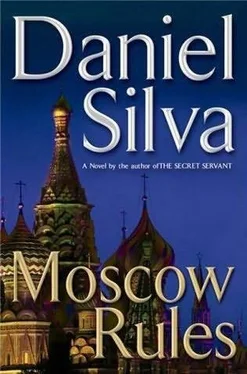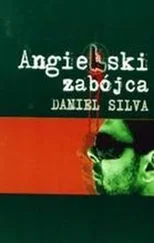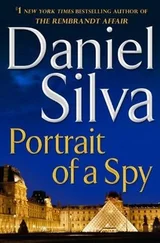That evening, Gabriel ate dinner while standing before the canvas. Shortly after nine, he heard the sound of car tires crunching over the gravel drive and an engine note that was unfamiliar to him. He walked over to the window and peered down as a tall woman with pale blond hair emerged with a single bag slung over her shoulder. She came upstairs to the studio and stood at his shoulder while he worked.
“Would you like to tell me why you’re forging a Cassatt?” asked Sarah Bancroft.
“The owner won’t sell me the original.”
“What happens when it’s finished?”
“You’re going to sell it to Elena Kharkov.”
“Ask a silly question.” She leaned forward and scrutinized the canvas. “Watch your brushwork on the hands, Gabriel. It’s a bit too impasto.”
“My brushwork, as usual, is flawless.”
“How foolish of me to suggest otherwise.” She smothered an elaborate yawn. “I’m running on fumes.”
“You can sleep here tonight, but tomorrow, you’re moving up to the main house. Uncle John is expecting you.”
“What’s he like?”
“I wouldn’t want to spoil the surprise.”
“If you need any more advice, don’t hesitate to wake me.”
“I think I can manage on my own.”
“You sure about that?”
“I’m sure.”
Sarah kissed his cheek and slipped silently through the doorway. Gabriel pressed the PLAY button on a small portable stereo and stood motionless while the first notes of La Bohème filled the room. Then he tapped his brush against the palette and painted alone until midnight.
Sir John Boothby was introduced to his American niece, an attractive young woman now using the name Sarah Crawford, over breakfast the following morning. Gabriel swiftly sketched the missing chapters of their long and cordial relationship. Though Sarah’s mother, now deceased, had been foolish enough to marry a Wall Street banker, she had made certain her daughter maintained strong connections to England, which is why Sarah had spent summers at Havermore, and why she still made an annual pilgrimage to the estate now that she was in her thirties. As a young girl, she had stayed in the nursery and formed a deep bond with Two Children on a Beach . Therefore, it would be natural for Sarah to show Elena Kharkov the painting rather than her uncle, who had never really cared for it. The Cassatt would be viewed “in situ,” meaning that Sarah would be required to escort Elena to the upstairs to see it, thus leaving her ample time for a quiet but unmistakable approach. Uncle John’s task would be to assist in the separation of Elena from her bodyguards. Gabriel estimated they would have ten minutes. Any more than that, he reckoned, and the bodyguards would start getting jumpy. And jumpy Russian bodyguards were the last thing they needed.
With Sarah’s arrival, the pace of the preparations increased dramatically. M amp;M Audio and Video rolled into Havermore, disguised as local electricians, and installed cameras and microphones around the house and the grounds. They also created a makeshift command post in the hayloft of the barn, where the feeds could be monitored and recorded. Sarah spent her mornings “reacquainting” herself with a home she knew well and cherished deeply. She spent many pleasant hours with her uncle, familiarizing herself with the vast old manor house, and led herself on long walks around the estate with Punch and Judy, Boothby’s poorly behaved Pembroke Welsh corgis, trotting at her heels. Old George Merrywood invariably stopped her for a chat. His local Gloucestershire accent was so broad that even Sarah, who had spent much time in England, could barely understand a word he said. Mrs. Devlin pronounced her “simply the most delightful American I’ve ever met.” She knew nothing of Sarah’s alleged blood relationship to her employer-indeed, she had been told by Sir John that Sarah was the daughter of an American friend and had recently gone through a nasty divorce. Poor lamb, thought Mrs. Devlin one afternoon as she watched Sarah emerge from the dappled light of the North Wood with the dogs at her heels. What idiot would ever let a girl like that slip through his fingers?
In the evenings, Sarah would wander out to the gamekeeper’s cottage to discuss the real purpose of her stay at Havermore, which was the recruitment of Elena Kharkov. Gabriel would lecture her while he stood before his easel. At first, he spoke about the craft in general terms, but as the date of Elena’s arrival drew nearer, his briefings took on a decidedly more pointed tone. “Remember, Sarah, two people are already dead because of her. You can’t push too hard. You can’t force the issue. Just open the door and let her walk through it. If she does, get as much information as you can about Ivan’s deal and try to arrange a second meeting. Whatever you do, don’t let the first encounter last longer than ten minutes. You can be sure the bodyguards will be watching the clock. And they report every thing to Ivan.”
The following morning, Graham Seymour called from Thames House to say that Ivan Kharkov’s plane-a Boeing Business Jet, tail number N7287IK-had just filed a flight plan and was due to arrive at Stansted Airport north of London at 4:30 P.M. After hanging up the phone, Gabriel applied the final touches of paint to his ersatz version of Two Children on a Beach by Mary Cassatt. Three hours later, he removed the canvas from its stretcher and carried it downstairs to the kitchen, where he placed it in a 350-degree oven. Sarah found him there twenty minutes later, leaning nonchalantly against the counter, coffee mug in hand.
“What’s that smell?”
Gabriel glanced down at the oven. Sarah peered through the window, then looked up in alarm.
“Why are you baking the Cassatt?”
Just then the kitchen timer chimed softly. Gabriel removed the canvas from the oven and allowed it to cool slightly, then laid it faceup on the table. With Sarah watching, he took hold of the canvas at the top and bottom and pulled it firmly over the edge of the table, downward toward the floor. Then he gave the painting a quarter turn and dragged it hard against the edge of the table a second time. He examined the surface for a moment, then, satisfied, held it up for Sarah to see. Earlier that morning, the paint had been smooth and pristine. Now the combination of heat and pressure had left the surface covered by a fine webbing of fissures and cracks.
“Amazing,” she whispered.
“It’s not amazing,” he said. “It’s craquelure.”
Whistling tunelessly to himself, he carried the canvas upstairs to his studio, placed it back on the original stretcher, and covered the painting with a thin coat of yellow-tinted varnish. When the varnish had dried, he summoned Sarah and John Boothby to the studio and asked them to choose which canvas was the original, and which was the forgery. After several minutes of careful comparison and consultation, both agreed that the painting on the right was the original, and the one on the left was the forgery.
“You’re absolutely sure?” Gabriel asked.
After another round of consultation, two heads nodded in unison. Gabriel removed the painting on the right from its easel and mounted it in the new frame that had just arrived from Arnold Wiggins amp; Sons. Sarah and John Boothby, humiliated over being duped, carried the forgery up to the main house and hung it in the nursery. Gabriel climbed into the back of an MI5 car and, with Nigel Whitcombe at his side, headed back to London. The operation was in Alistair Leach’s hands now. But, then, it always had been.
Gabriel knew that discretion came naturally to those who work the highlands of the art trade, but even Gabriel was surprised by the extent to which Alistair Leach had remained faithful to his vow of silence. Indeed, after more than a week of relentless digging and observation MI5 had found no trace of evidence to suggest he had broken discipline in any way-nothing in his phone calls, nothing in his e-mail or faxes, and nothing in his personal contacts. He had even allowed things to cool with Rosemary Gibbons, his lady friend from Sotheby’s. Whitcombe, who had been appointed Leach’s guardian and confessor, explained why during a final preoperational dinner. “It’s not that Alistair’s no longer fond of her,” he said. “He’s chivalrous, our Alistair. He knows we’re watching him and he’s trying to protect her. It’s quite possible he’s the last decent man left in the whole of London -present company excluded, of course.” Gabriel gave Whitcombe a check for one hundred thousand pounds and a brief script. “Tell him not to blow his lines, Nigel. Tell him expectations couldn’t be higher.”
Читать дальше












